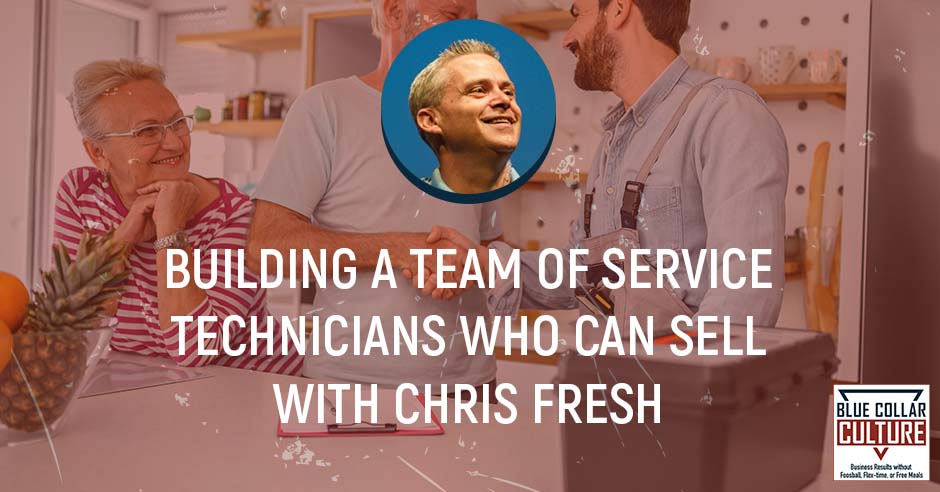
If you’re struggling to get more sales and want to increase your business’s revenue and profitability, you’ve come to the right place. Joining us on today’s episode to share tips on how to build a team who can sell and scale your business is Chris Fresh, Founder and CEO of The Plumbing Sales Coach. We will talk about things that transcend the service industry and will impact any business you have. From how to differentiate services, communicate with customers, create culture, and market your business, it all starts with having the right people. Listen to this episode and get ready to take some notes on different strategies you can use to grow your business.
—
Building a Team of Service Technicians Who Can Sell With Chris Fresh
We have a lot of subject matter experts and different guests on this show but very rarely do we have someone on this show that is doing something that’s so closely aligned with what we do over here at Core Matters. Our guest works with service plumbers, those that are moving into the service world or who’ve been in the service world for a while. They’ve hit a wall and they’re stuck and they need to figure out, “How do I scale my business and take it to the next level?”
I know I said plumbing but I can promise you, in this episode, we are going to talk about things that transcend your industry that is going to impact any business that you have. If you’re struggling to get out of the business and get more sales, you want to increase revenue or profitability, engage and motivate your team, we cover a lot in this episode.
As business owners, we can do so many things to make a change in our business, but when it comes down to it, there are only a couple of key things that if we get these things right, everything else is going to become much easier. I want to welcome to the show my guest, Chris Fresh. He’s the Founder of The Plumbing Sales Coach. Get ready to take some notes. There is going to be a lot of great information and he’s got a great offer for you at the end of the show. Let’s get started.
—
Chris, welcome to the show.
How are you doing?
I’m looking forward to this conversation. We’ve known each other for a little while. I don’t know why it didn’t occur to me to invite you to the show and share your expertise with our readers but we finally are making it happen. I’m super excited about that.
I appreciate you having me on here and I’m excited to share. I love what you’re doing in your industry.
The prospect is that you are helping these service contractors. You are mostly focused on plumbing.
We strive to help the service plumbing industry or the owners that have that. Maybe they have a construction or a commercial side of that but they want to get into service or they’re already in service and they know there’s got to be a better way. That’s typically whom we focus on helping.
Even if you’re not a plumber though, a lot of what we’re going to talk about is going to be relevant if you want to grow or scale your business. When you think about the people that want to either transition in or scale their business, what’s the biggest myth that they’re hanging on to that’s holding them back that you want to break down?
It’s not only applicable to service plumbers but to anybody in the service industry that’s providing something on top of a product. A lot of people believe that the consumer is focused on price or the cheapest price. The reality is that people don’t have a problem spending money. They only want to get something in return for their money. Our job is to show them what they’re getting.
A lot of people believe that the consumer is focused on price. The reality is that people don't have a problem spending money. They just want to get something in return for their money. Click To TweetIn the recruiting or the hiring that we do, everybody’s focused on money. They want to make more money. That’s not the case at all. That myth transcends both your employees and your customers. Tell me about it. Why do people hold on to that belief? What can they do to work on overcoming that?
The biggest problem as an owner or even as an employee is we often view what we do as a commodity. The reason why that happens is the consumer views us as a commodity. We have to separate ourselves from that. I simply mean this and we can talk about plumbing. If you’re clearing a drain, unclogging someone’s drain that’s clogged and that’s all that you offer, you’re going to be compared to everybody else that unclogs drains. You have to separate yourself from that. That’s where we get into the details of how to do that in the service industry, take it to that next level and make sure the customer is getting an experience more than a product.
When you said that, I had that vision of that thing I see at Home Depot. That long piece of plastic with the little teeth on it that you put down your drain and pull up. That’s your competition if all you’re doing is unclogging a drain.
The homeowner says, “I could have done that.”
For $3.99.
The reality is that they couldn’t have done that because we’ve come in several times behind them when they tried to do it and it’s worse.
It’s cheaper to get the problem fixed the first time than it is to make it worse and then have to fix it. They hold on to this belief and I hear this a lot. We help a lot of these home service contractors with hiring CSRs. The number one challenge these CSRs have is, “They don’t want to pay the dispatch fee or they say we’re too expensive or this.” That’s what you’re saying. The market is breeding that belief system a little bit. How do they overcome it?

It’s the question we get a lot and words matter. A lot of times, how do we view that fee? What’s that fee doing? What are we educating our team on what that feed does? That’s what’s going to get communicated to the customer. If we’re covering costs, taking care of ourselves or making sure that we don’t waste our time, what happens is the customer feels disenfranchised in the fact that, “You’re only looking out for you.” They then carry that over to what they expect the experience to be.
Change that to what you’re going to do for them for that money. Show them the value and what they’re going to get. Since we’re talking about that dispatch fee, first of all, I like to call it a diagnosing fee. The mechanic world has already valued diagnosis at a price point. It means that people understand paying for a diagnosis when they take their car in somewhere. They’re already educated on that.
That’s what we do on the phone. “We’re going to come out and diagnose. We’re going to spend some time finding out what the bigger issue is. Once we know what that is, we can come up with some solutions. We do charge a $79 fee to come out and do that. However, if we do work, we waive that fee. It sounds like you’re going to need some work done. I’m not even sure if this is going to apply to you.” We then move on with booking the call. Most customers are like, “You’re right. I do need work done. I do have a problem. You probably do need to figure out what’s going on. That is going to take time. This fee is covering me. It makes more sense and I’m willing to pay for it.”
It’s WIIFM. What’s In It For Me? Everybody wants to know that. I’ve never called a contractor and said I don’t want to pay for their service before I dialed the phone. I never was like, “I hope I get this for free.” I’ve never thought that. I’ve always been prepared to pay something and most consumers are that way as well. They got to like you.
I love that little shift you made because you emphasized “our.” It’s to cover our costs and time. Don’t even make it about that. We want to diagnose the problem for you. I love the comment that you made about the auto industry has already conditioned us to understand that diagnostic fees are a normal part of life. It starts with the same letter even.
Dispatch is covering me and diagnosing is covering you. Words matter. The next question I get is, “Chris, what about people that call about price? They only want to know what the price is going to be.” They don’t necessarily want to know what the price is going to be. That’s only their way of sifting through the people that are going to rip them off in their minds or take advantage of them. That’s their tactic and what they’re good at. They’ve caught a lot of other people. What I tell people is, “Those people are listening for yes and not no.” “Will you give me the price of the phone?” That’s what they’re listening for. You have to find a way to explain what you’re going to explain to them without turning off their ear.
It goes like this. If they say, “How much is a water heater?” I say, “I can do something even better for you.” That gets their ear turned on to go, “What’s better than a price over the phone?” From that point on, I typically teach the plumbing company to say what they’ve already been saying at that point but the customer’s listening instead of you going, “No, I can’t give you a price over the phone.”
It's about will not skill. You can teach people how to push buttons or connect something to something or to communicate a certain message, but to get them to want to do that is a whole different game. Click To TweetTheir ears are turned off and whatever you say doesn’t matter. It can be that simple in any industry, the sales world. It’s changing the words, the delivery and putting yourself in the customer’s shoes going, “What are they asking me? What are they saying when they said that?” They trying to get to something else. “Can we get there a different way because I want to get there too?” There’s a process. “How can I communicate that?” To me, that’s the key.
I love that concept of, “Are they open to hearing you? Are they turned on and listening? Are they turned off and they are listening?” If they told me no there, they are probably going to tell me other things I don’t want to hear. There’s everybody out there that will promise a cheap price over the phone. They know that when they’re standing there. They’re looking at your water heater and took them four hours to get there. What are you going to do? Are you going to say, “Don’t charge me the extra money?” No. The guy’s already there and they know that. Where a lot of that industry reputation comes from is we’ve got a few bad actors out there doing that stuff.
You hit it. It all comes back to motive and that’s what the customer is questioning. They don’t know your motives in the beginning so they fill in the blank. You admitted yourself as a consumer. People are offering the cheapest price. I have eight kids. Black Friday has been a place of business for us in the past where we wanted to save money for Christmas but the product that we got matched the price. We know that. However, if I were the salesperson, I tell you, “Be careful with the other price. It might not be what you think.”
Even though you know that’s true, you reject the message because you don’t know my motive and you think, “You’re only trying to sell me.” We have to understand that’s where the customer’s coming from. If you’re the salesperson, it’s not about us. It’s about what they want. That’s what I love about what you do. If the same is true for the consumer, then the same is true for the future employee who is the first customer of the company. It all goes hand in hand. All this stuff is the relationship.
There are probably people reading that are like, “It’s great and I love how Chris says that but my CSRs would never do that. They would never behave and act that way.” What’s interesting and you already said this is the employees are the first customer. If you’re hiring right and you’re coaching and investing in training your employees, they’re going to do right by the customer.
They’re going to be able to take these things and say, “What is in the customer’s best interest? I’m being taken care of by my employer so I’m going to take care of the customer,” versus what a lot of it is, “You got to get that spiff and close that deal. If you don’t put those tickets on the board, you don’t have a job next week.” What have we done? We’ve redirected it all back to the employee. It’s all about me now. I’m not worried about the customer.
It’s exactly what we talked about. People should understand that it’s about will not skill. You can teach things to people. You can teach people how to push buttons, connect something to something or communicate a certain message but to get them to want to do that is a whole different game. It’s a lot easier to teach the skill to somebody who wants it than to make somebody want it that has the skill. That is the biggest message here. When you get the best version of someone, that’s when the magic happens and it doesn’t matter how experienced they are.

You work with your clients on not only helping them find these people. You talk a little bit about recruiting in your program but you’re also coaching these people on how to improve the sales process and helping them build that process out. Tell me a little bit about what you’re doing there in a big picture or high level. I’ve got a couple of questions for you on how our readers can start applying a couple of these things.
I do think that businesses are complex but at the same time, it is simple. There are some simplicities to it that we can follow. As we get into those, we can get as complex as we want, depending on our skillsets and our team. What I mean by that is this. You need exposure. We teach that. People have got to know that you’re a business and that you exist. The second thing that we hone in on is what are they seeing when they see you like reviews, your brand, messaging, personal Facebook posts and all the things that we forget about that people have access to.
The last thing is, what are you going to do with that customer? What’s the process that you have in place? I say process as a general term but then inside of that is a sales process or a dispatch process, maybe for service plumbing. If you’re a restaurant, you have to have a process from the time that the person grabs that front door handle, walks in and stands in the lobby to them sitting down and eating their meal, even when they leave and make it available for the next person to come in and eat at that same table.
That’s the business of the restaurant industry. We all have to have those processes. That’s what we teach. Inside of that, we dig deep into their business, specifically your market and where are you. What makes sense there? For fun, we rebranded a company in Indiana. It’s a plumbing company. It hasn’t even been released yet. People might be reading this and go find it later but we’re in the middle of the van wrap.
It’s a big, huge piece of corn. He’s carrying a bucket of water and people might go, “What’s that?” The company name is Cornwell and they’re in Indiana. It’s having fun and helping people see the fun in the business. Also, get back to that dream that they were building, not the nightmare that they’re living in and help them do what they originally wanted to do. We know there are some common processes and things that have to be dealt with to get to that dreamland and dream world, wherever they want their business to go. That’s what we do. That’s what we take pride in and what we love doing.
I’m thinking of the business owner in the context of what you shared but as you mentioned with those CSRs, if they have the will, we can teach the rest of it. They’ve got to have the will to want to change, have a little fun with it and say, “Let’s make it about the customer and not about me.” All the rest of the stuff is easy.
We did this coaching call talking about what we were going to talk about. Before we started, I felt in my heart that we need to deal with accountability so we talked about that and it’s what you’re talking about. It does because there are companies that get into our program and they explode. One guy was sharing his story. He has $3,000 a week by himself in a truck and gets in the program. Within a month, he’s doing $10,000 a week. A couple of years into it, he’s doing millions a year. He’s rolling, rocking and loving it.
With culture, make it about your end-user always. Click To TweetI got other people who get into the program in the first six months with them questioning everything that we say. I got other people in the program that is like, “Are you in the program? Hello? I haven’t seen you.” I tell my clients this, “I’m just a book. If you buy me and put me on the bookshelf, I’m no good. You got to read and apply it. Otherwise, what’s the point? It all comes back to that accountability.”
Let’s talk about that. The easy part is taking it off the bookshelf and reading it. You got to apply it. What’s something that the readers could apply in their business to help them? Something that you see is pretty much universal. Everything you’ve said here already is a universal truth. You got to have processes, people with the will and make it about the customer. What are 1 or 2 things you can share with our readers that will help them see that this is possible?
I’ll say two things. Culture is the environment. If you think about an aquarium, a fish can only get so big. You could feed it but it has to have the right aquarium. That’s the culture. With culture, make it about your end-user always. When you’re talking to your team internally, how can we make it better for the consumer, the person spending the money? None of this exists without them. How can we always make it better for them?
If you can change that focus, the way you talk inside of your company with your team and outside of your company, you can always make it about the customer. Everybody reading could go to the internet and look up a company called Mr. Drippy Plumbing in Birmingham, Alabama. It’s a fun company. Mr. Drippy is a cool little logo. They do a great job always making it about the consumer. The culture, the team and even the new guy getting hired in. The other team members are saying, “Make it about the consumer.” That’s number one.
Number two, permeate your community with your brand. When I say permeate, I mean to get in it. Don’t be like a big billboard but be a part of it. Live in it. Help it. Serve it. Make an impact on it. If you want the best pay-per-click return on investment ad in the world, don’t run them. Instead, make everybody fall in love with you because you’re making an impact where they live. You need pay-per-click and SEO in the beginning because you don’t have anything else.
All those things matter. I’m not saying they don’t. I’m saying that if you want to be in your market for a long time and be somebody that people look to as a solution, permeate your community. Get in the farmer’s market or into the schools if that makes sense for you. Everything in your city is a billboard, even the placemat you’re looking at when you eat and the 18th hole at the miniature golf course.
Can your logo sit there on the 18th hole? That’s the most popular thing in town. Mr. Drippy has a water park in their town. We’re talking about getting Mr. Drippy and a costume in the water park plumbing. How can you do this? He’s got a Mach-E Mustang wrapped because that costs $800 to drive around every month in the city rather than a billboard and it’s even cooler than a billboard. How can you get creative with your brand and permeate your community so people go, “I’m glad they’re here?” Those would be my two biggest pieces of advice.

The first one near and dear to my heart is culture. I believe that as an owner, the first and foremost thing you need to do is focus on your people and build a strong culture. When you’ve got great employees and what I call the core, they’ll take care of everything else for you. If you want your employees to treat your customers better, treat your employees better. If you want your employees to get you more customers, help your employees get more out of their life. There are so many things you can do around culture but that second part, I want to dig into it. Permeate into the community. If I’m starting or I’ve got maybe 1 or 2 trucks on the road and maybe I’m still in a truck on occasion, how do I find the time for that?
Most humans are like water. We follow the path of least resistance. I was talking to somebody about the idea of being an attractive character in their market. I said, “We all do that differently.” Here’s what I mean. If you’re trying to permeate your community, what is your gift? Are you good at Facebook posts? Are you somebody who’s a talker? What do you naturally do? How do you normally interact with your community? All I would say to you in the very beginning is to do more of that and include the fact and make sure they know you’re a plumber. It could be that simple. Make sure that all of your friends and family know that you’re a plumber.
Many of us miss that first step. We go right for Google or some ad or somebody wants to put us in a magazine with a bunch of strangers. What about the people who know us? We’re talking about the brand new person. If you have somebody in a truck and your phone is already ringing, that means you have a little bit of money. This is going to sound a little counter-intuitive but my guess is you’re probably not producing what you could be producing with those same calls and that same opportunity.
Find some training for your team. Make your team better. Make them so that they can go out and make an impact in the community but also maximize those tickets so you have a marketing budget. What I would tell you to do at that point in the market is you’re going to need some money. You’re going to not spend it with me but you’re going to need some money to get into your community. People want money to advertise or showcase you. You’re going to need that.
You’re going to need some resources to trade or exchange. You’re going to need something. If you’ve got the phone ringing because you started telling everyone you’re a plumber and you treat your employees great, what are they probably telling everyone? They work for this cool plumbing company. That word is getting out. Start there. Put some generic face. Don’t create a Facebook page just yet. Go on your personal page and say, “We started a plumbing company. If you need anything, don’t hesitate.” Assume that no one saw that post and don’t be annoying. Don’t make every post about that but every couple of days, remind everybody, “We do plumbing.”
Another cool thing you can do is when you do plumbing, let everyone know you did some plumbing for someone. That’s another way of advertising yourself without advertising yourself. You can make it about the person you did the work for. You don’t need to make it about you or your employee like, “Steve did a great job over here for Mrs. So-and-So,” or whatever you’re allowed to share. It’s because you’re communicating to so many more people than you realize. We’ll leave it at that but I would scream from the mountaintops as comfortable as I was in my way of communicating. “Everyone, I do plumbing. Give us a chance.”
I remember in one of my first sales jobs, I’d have a friend or a family member call me. They’re like, “You’re not going to believe it. I refinanced my house.” I’m like, “I’m in the mortgage business. What are you talking about? Why didn’t you call me?” “I didn’t even think to call you. I forgot. That’s right. You told me.” It’s so common sense and basic but we forget. Just because we’re consumed with our profession or our business doesn’t mean that the people that care about us are consumed with it. They got their lives, distraction and things going on. I’ll promise you, the people reading are going, “I do that. I forget to tell people so much.”
When you do plumbing, let everyone know you just did some plumbing for someone. That's another way of advertising yourself without advertising yourself. Click To TweetIt’s so funny. I had to leave the mic for a second because I was dying when you said that. It’s so true. We’ve all been there. When I was younger, I worked at CarMax. I’ve had people come into CarMax and I see them working with someone. I got my hands in the air like, “What?” It’s too late. They’re already working with someone. Make sure everybody knows that you do it. Don’t be annoying. Don’t be that one guy but at the same time, let everybody know.
If you opened up a new line, I’m sure you have a wide range of people that tune in. It doesn’t matter what it is that you do, painting or plumbing. Let people know what you do so they can then come to you for that service when they’re ready. Stay top of mind. I was thinking of this. There are so many people I know in life that will tell me, “I’m going on a trip. I’m doing something.” When they tell me, I remember but then when they walk away, I forget. Later on, I see a post somewhere or something of their trip and I’m like, “That’s right. So-and-so was going.”
It’s not only with your business. This is normal because it’s not affecting me. When you tell me you’re a painter and I don’t need painting, great but I already forgot. Tell me one more time a little bit later. American Express did a survey and they figured out that it takes 4 to 7 touches with somebody before they can consciously make a decision that they want to do business with your product or service. We’re already not telling people once.
We’re not going to have a lot of time to dig into this but you have this philosophy about recruiting. I share the same philosophy about how often and how frequently you should do it. It’s funny to me how many times we work with companies and they’re like, “I can’t find anybody.” I go, “Have you asked your team?” “My team knows we’re hiring.” I’m like, “Let’s ask them.” “I had no idea we had 7 open positions and we had 4 empty trucks. I didn’t know that.” There was a study done and this was a while back. How many times has the CEO had to say something before everybody in the organization heard it at once? I don’t know if you’ve heard this or not, Chris.
No, but I can only imagine.
It’s 37 times. Trust me when I tell you that your people do not know that you’re recruiting. They don’t even know that you want more customers. I promise you. They think you’ve got it all figured out if that’s not their world. You got to be doing this stuff that you’re talking about.
You nailed it and the idea too that they don’t know you’re hiring. They might be filling in a different thing or a negative thought. They’re like, “Why do we have four trucks sitting empty? Are we getting slow? Is your work drying up? Do I need to start looking?” I promise they could be doing that because you don’t find out until they’re not there or they come in and say, “Can we talk?”

You have that talk and then you’re scrambling around, “This guy’s going to offer him $1.25 more an hour. I’m about to lose someone that I’ve invested thousands of dollars of training into.” You’re like, “Should I pay him the other $1.25?” When you tell people you’re hiring, they hear that message and what they know is you’re growing, that’s comfortable and a good thing. Always communicate that.
If you’re running your team ragged with OT and they’re running lots of overtime because you are short-staffed but you’ve got the volume of work coming in, letting them know you’re hiring says, “You’re working too many hours and not spending time with your family. I’m working to solve the problem.” Asking for help, you’d be amazed at how many people are going to want to help you.
Sympathy is, “I’m sorry you’re going through all that but it’ll slow up soon.” Empathy is, “We’re hiring.”
I love the way you summarize that at the end. Chris, we could keep going. We needed to do another episode here soon. How do people get ahold of you? You only work with the service plumbers or people that want to get into service plumbing. If you’re a plumber reading and you’re like, “I got to have some of that stuff,” how do people get ahold of you? You’ve got an offer for them as well.
We’re going to do this specifically for the people that are only reading this show. You’ll need to mention that. Go to ThePlumbingSalesCoach.com. There are several spots there where you can request more information or get information about our program but simply put in the message there that you’ve known me on the show. We’ll give you a 30-minute consultation at no charge. We’ll work out what are your biggest problems right there on that call.
Take Chris and his team up on that one. It’s an amazing opportunity. He is an amazing guy. Chris, I love what you’re doing, your philosophy and your approach. It is so much in alignment with what I do. That’s probably why we get along so well. This is amazing stuff. I love the way you ended it with sympathy versus empathy. That transcends everything, not just business. Thanks for being on the show, Chris.
Thanks for having me, Ryan. I do appreciate it. I do love what you’re doing as well.
Important Links
About Chris Fresh
 When it comes to business, Chris has done it all. He started his plumbing career by taking a local shop to 7 figures in less than a year. This of course is after he had owned his own successful business in the home services world and was a top 10% sales rep at multiple Fortune 500 companies. Chris is definitely no stranger to success in business, sales, and coaching. He has helped 1,000’s of techs and 100’s of owners make big money and get their life back.
When it comes to business, Chris has done it all. He started his plumbing career by taking a local shop to 7 figures in less than a year. This of course is after he had owned his own successful business in the home services world and was a top 10% sales rep at multiple Fortune 500 companies. Chris is definitely no stranger to success in business, sales, and coaching. He has helped 1,000’s of techs and 100’s of owners make big money and get their life back.
Love the show? Subscribe, rate, review, and share! https://bluecollarculture.com/podcast/
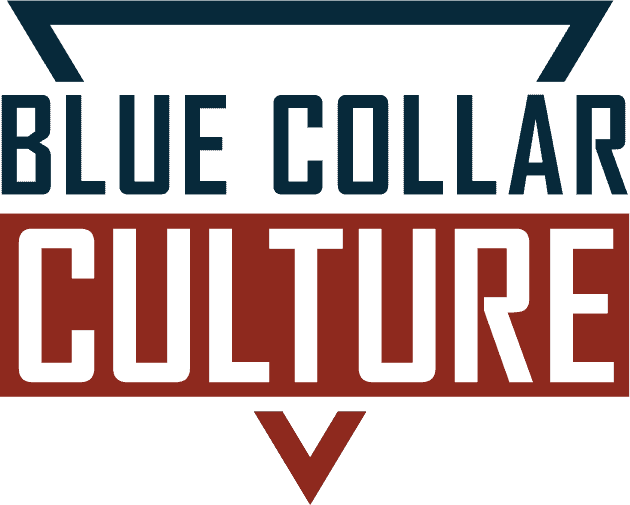
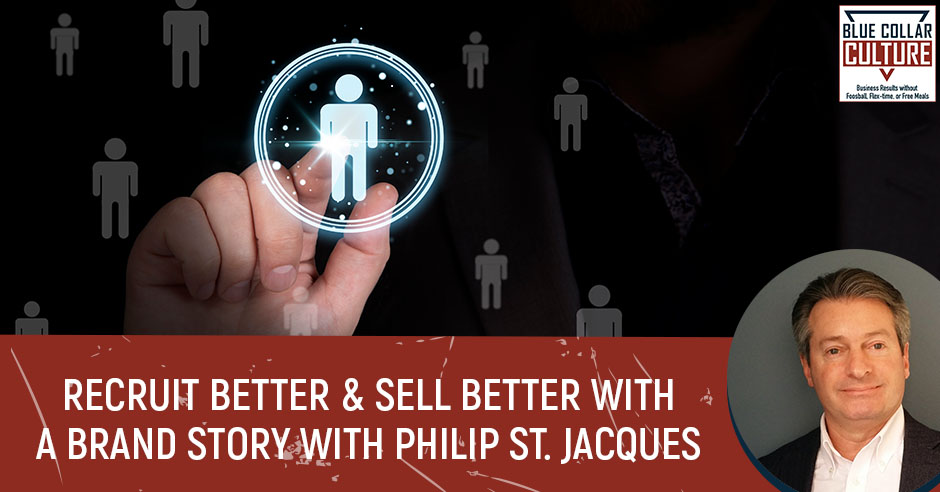


 Brothers Philip and Michael started St. Jacques Marketing in 1991. St. Jacques has grown significantly and now specializes in closing the gap between marketing and sales and is a brand of marketing thought leadership. Their insight-based strategic process is the hallmark of St. Jacques Marketing’s success today that’s core to the St. Jacques brand of marketing leadership. Understanding that quality research and analysis delivers insights that leads to distinct positioning is the cornerstone of marketing success.
Brothers Philip and Michael started St. Jacques Marketing in 1991. St. Jacques has grown significantly and now specializes in closing the gap between marketing and sales and is a brand of marketing thought leadership. Their insight-based strategic process is the hallmark of St. Jacques Marketing’s success today that’s core to the St. Jacques brand of marketing leadership. Understanding that quality research and analysis delivers insights that leads to distinct positioning is the cornerstone of marketing success.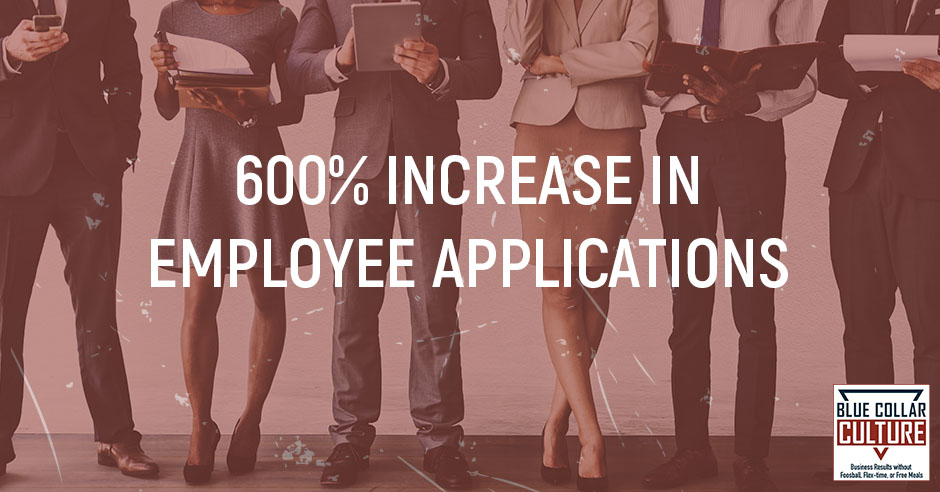



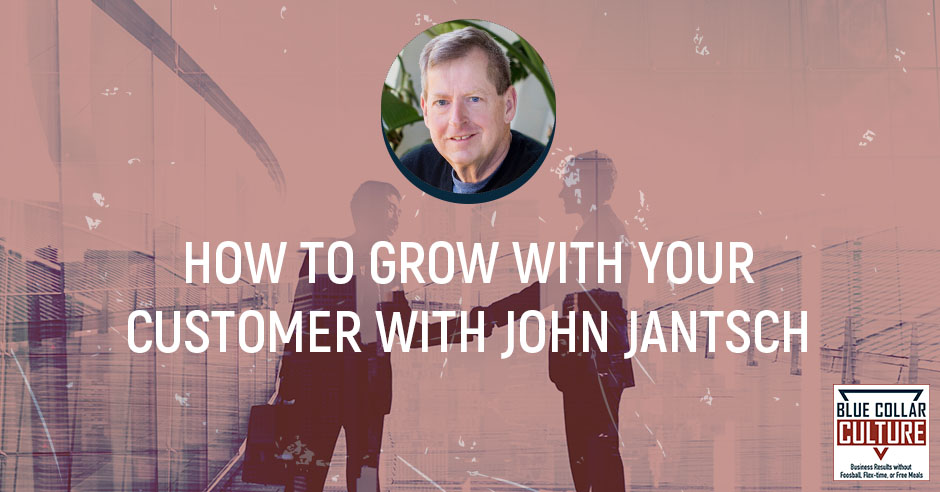
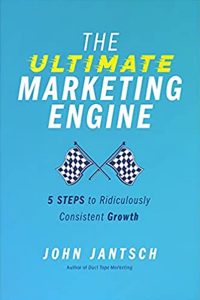
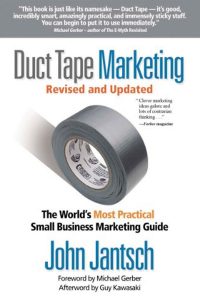


 John Jantsch is a marketing consultant, speaker, and author of Duct Tape Marketing, The Referral Engine, The Self-Reliant Entrepreneur, and The Ultimate Marketing Engine. He is also the founder of the Duct Tape Marketing Consultant Network, which trains and licenses independent consultants and agencies to use the Duct Tape Methodology.
John Jantsch is a marketing consultant, speaker, and author of Duct Tape Marketing, The Referral Engine, The Self-Reliant Entrepreneur, and The Ultimate Marketing Engine. He is also the founder of the Duct Tape Marketing Consultant Network, which trains and licenses independent consultants and agencies to use the Duct Tape Methodology.